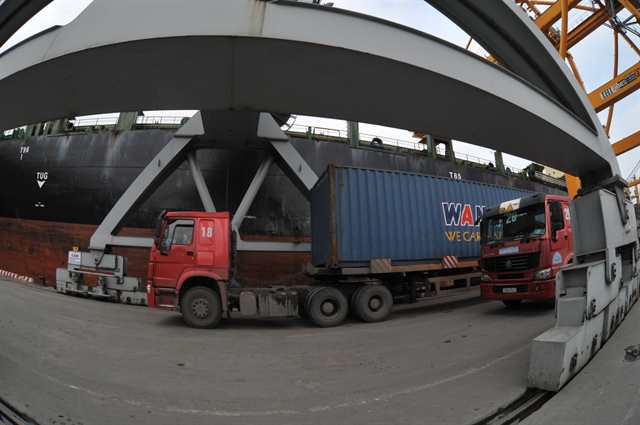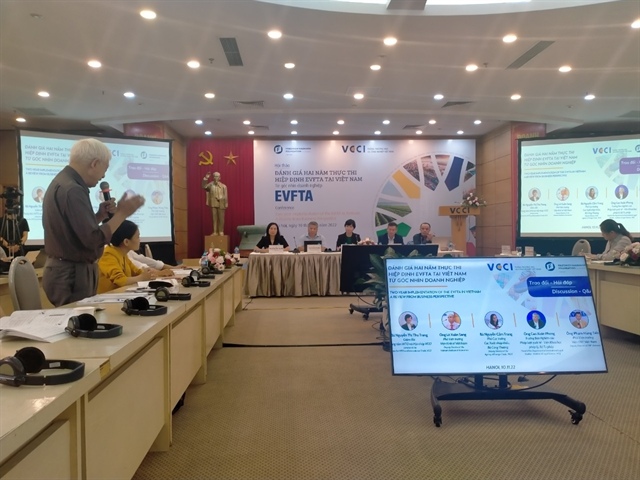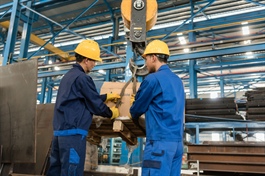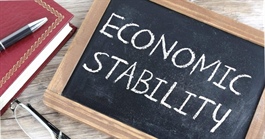Business awareness of EVFTA advantages grows
Business awareness of EVFTA advantages grows
The EU-Vietnam Free Trade Agreement (EVFTA) has significantly contributed to promoting Vietnam’s exports to the international market over the past two years. However, the business community is urged to be more proactive in seeking information about the EU market to maximize the advantages of the agreement.
According to Nguyen Cam Trang, Deputy Director of the Ministry of Industry and Trade’s Agency of Foreign Trade, the EVFTA has contributed significantly to boosting Vietnam’s exports to partner markets since taking effect in August 2020. Many products experienced impressive export growth, such as steel and iron by 739 percent, cameras and components by 260 percent, machinery and equipment by 82.3 percent, rice, bamboo and rattan products by more than 50 percent, ceramic and porcelain products by 25 percent, and vegetables and fruits by over 15 percent.
A recent review by the Vietnam Chamber of Commerce and Industry (VCCI) and the Friedrich Naumann Foundation Institute (FNF) Vietnam of the EVFTA’s effects on over 500 enterprises found that nearly 41 percent reported benefitting from the deal, said Nguyen Thi Thu Trang, Director of the VCCI Center for WTO and International Trade. The most common advantages are the preferential tariff and sales growth.

The EVFTA has contributed significantly to boosting Vietnam’s exports to partner markets since taking effect in August 2020 |
According to economic experts, companies have made good use of opportunities provided by the EVFTA for production and business activities. The report also found an improvement in enterprises’ understanding of the agreement, with nearly 94 percent having heard or knowing to different degrees about the EVFTA.
Three out of every 10 enterprises reported having extensive knowledge of EVFTA, with one in 10 particularly well-versed with its commitments as they relate to their business operation. Some 76 percent of surveyed businesses expected that the EVFTA and other free trade agreements would have positive impacts on their business prospects in the next three years.
Although Vietnamese enterprises have utilized EVFTA opportunities to a significant degree, many also pointed to obstacles making it difficult for them to benefit from this and other FTAs, including market fluctuations and uncertainties, limited competitiveness, and lack of information about commitments and their utilization. Nearly half of surveyed enterprises mentioned this challenge and assessed that their competitiveness is still limited. Businesses reporting a lack of information about EVFTA accounted for 40 percent.

A workshop reviewing the EVFTA implementation over the past two years |
Based on the results, Dr. Cao Xuan Phong, Head of the Institute of Legal Studies, suggested that accelerated institutional reforms are needed to implement the EVFTA and other new-generation FTAs more efficiently. According to Trang, enterprises should be active in taking advantage of EVFTA commitments by monitoring various economic factors affecting logistics, such as market developments, global economic fluctuations, the effects of the Russia-Ukraine conflict, and inflation in EU member states in order to adopt better strategies. Enterprises also need to innovate their production and business methods to create high-quality products that better meet the requirements of the EU market.
| To create more favorable conditions for enterprises, Vietnam has amended/supplemented nine legal documents to meet specific commitments under the EVFTA. Most of the provisions in the legal documents on implementing the EVFTA are compatible with the commitments of the agreement. |





















